
The authors take a closer look at these ongoing efforts to harmonize compendial standards, with perspective that may be helpful in considering the future direction of pharmacopoeias.

The authors take a closer look at these ongoing efforts to harmonize compendial standards, with perspective that may be helpful in considering the future direction of pharmacopoeias.
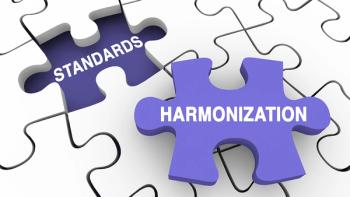
Pharmacopoeia harmonization provides better support for global regulatory agencies and addresses the global nature of bio/pharmaceutical manufacturing and supply.

This article examines the history and evolution of the pharmacopoeias and the particular challenges that must be overcome to achieve harmonization among the pharmacopoeias.

This article provides an end-to-end compendial framework to understand why compliance with pharmacopoeia standards is challenging.

This article provides the legal and regulatory basis for pharmacopoeia compliance and illustrates pharmacopoeia impact throughout the drug product lifecycle.
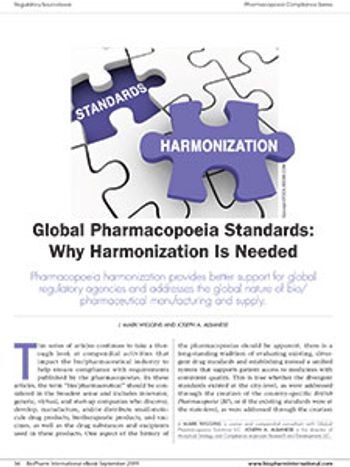
In this series of articles, the authors provide an understanding about the need for pharmacopoeia compliance and practical guidance to assist those who perform this work.
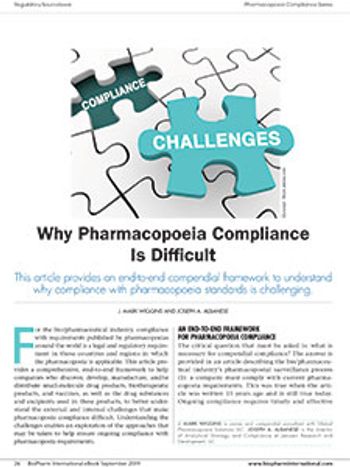
In this series of articles, the authors provide an understanding about the need for pharmacopoeia compliance and practical guidance to assist those who perform this work.
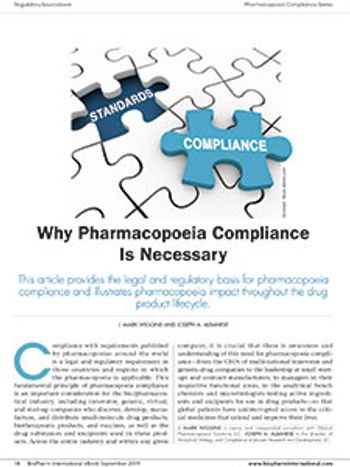
In this series of articles, the authors provide an understanding about the need for pharmacopoeia compliance and practical guidance to assist those who perform this work.
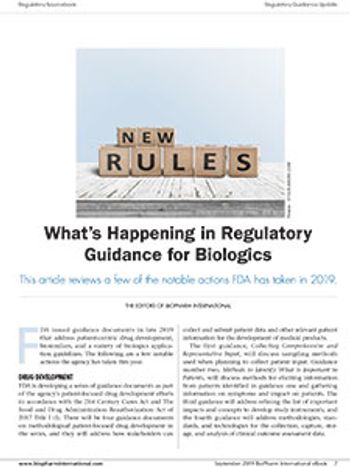
Regulatory agencies and pharmacopeia organizations revised policies and guidelines in 2019.
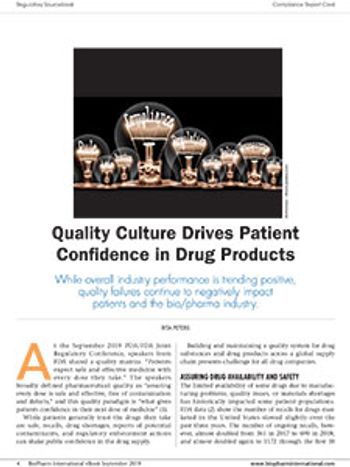
While overall industry performance is trending positive, quality failures continue to negatively impact patients and the bio/pharma industry.

In this series of articles, J. Mark Wiggins, owner and compendial consultant with Global Pharmacopoeia Solutions LLC, and Joseph A. Albanese, director of Analytical Strategy and Compliance at Janssen Research and Development, LLC, provide an understanding about the need for pharmacopoeia compliance.

The US Pharmacopeial Convention is partnering with the American Association of Colleges of Pharmacy to provide students with free access to quality standards.

FDA released draft guidance on using the USP pending monograph process in the drug application process.

The US Senate and the US Pharmacopeial Convention debate the necessity of monographs for biologics.

Both empty and filled syringes must pass a range of tests to meet quality standards for biopharmaceutical drugs.

A properly designed validation program will detect variation and ensure control based on process risk.

The USP Quality Institute’s third fellow in its Fellowship in Quality Medical Products program will study the role of poor-quality medicines in fostering antimicrobial resistance.

The US Pharmacopeial Convention’s new plan will include new and revised quality standards and activities to support the development of new generic drugs.

New FDA guidance developed to identify lapses in data integrity and promote best practices.

Microbial identity data can be critical for determining contamination sources.

Efforts strive to harmonize bioanalytical method validation for non-clinical and clinical studies.

FDA and ICH seek comment on new exposure levels for cadmium in drug products.

The European Directorate for the Quality of Medicines & Healthcare highlighted the organization’s achievements in 2017, including the first mAb monograph.

Representatives from the two pharmacopeias held a symposium on European and Indian legislation and regulatory requirements regarding the quality of drugs.

After a review of public comments, USP will not move forward with nomenclature proposal without further FDA collaboration.